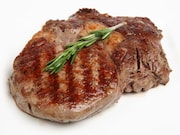Findings from prospective cohort study of sisters or half-sisters of women diagnosed with breast cancer
FRIDAY, Aug. 9, 2019 (HealthDay News) — Red meat consumption may increase the risk of invasive breast cancer, according to a study published online Aug. 6 in the International Journal of Cancer.
Jamie J. Lo, from the Columbia University Mailman School of Public Health in New York City, and colleagues evaluated the association between consumption of meat and incident invasive breast cancer. The Sister Study is a U.S. and Puerto Rico-based prospective cohort study that enrolled women with no previous diagnosis of breast cancer who are sisters or half-sisters of women diagnosed with breast cancer. This analysis is based on data from 42,012 participants in the Sister Study who completed a Block 1998 Food Frequency Questionnaire at enrollment (2003 to 2009).
The researchers found that over a mean follow-up of 7.6 years, 1,536 invasive breast cancers were diagnosed at least one year after enrollment. There was an association observed between higher consumption of red meat and increased risk of invasive breast cancer (hazard ratio for highest versus lowest quartile: 1.23; 95 percent confidence interval, 1.02 to 1.48; P for trend = 0.01). Higher consumption of poultry was associated with a decreased risk of invasive breast cancer (hazard ratio for highest versus lowest quartile: 0.85; 95 percent confidence interval, 0.72 to 1.00; P for trend = 0.03). There were no associations noted between cooking practices, estimated heterocyclic amines, or heme iron from red meat consumption and breast cancer risk.
“Red meat has been identified as a probable carcinogen. Our study adds further evidence that red meat consumption may be associated with increased risk of breast cancer, whereas poultry was associated with decreased risk,” a coauthor said in a statement. “While the mechanism through which poultry consumption decreases breast cancer risk is not clear, our study does provide evidence that substituting poultry for red meat may be a simple change that can help reduce the incidence of breast cancer.”
Copyright © 2019 HealthDay. All rights reserved.








